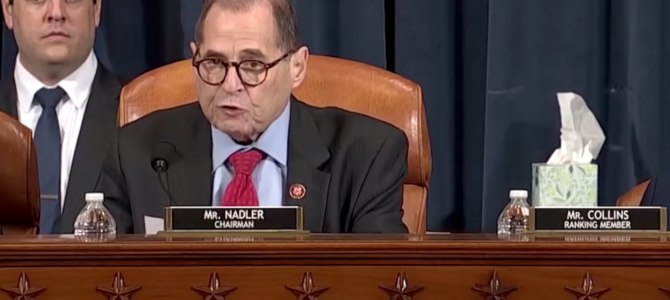
In light of President Donald Trump’s decision to commute Roger Stone’s sentence, congressional Democrats have once again decided to “investigate.” They have also pledged to limit the president’s pardon power, which they say he has abused to protect himself. To that end, Democrats have introduced several measures to curb or alter the president’s power to commute.
Despite their efforts, Democrats will likely have a difficult time limiting the president’s right to grant clemency beyond the limits in the Constitution. Moreover, their proposed measures should fail because they allow for unchecked harassment and abuse of the president.
As Fox News reported, Democrats have proposed two measures in response to the president’s decision to commute Stone’s sentence. According to House Judiciary Committee Chairman Jerry Nadler:
The first, H.R. 1627, the Abuse of the Pardon Power Prevention Act, will allow us a measure of transparency into the President’s power to pardon federal crimes and commute federal sentences. If the president uses the powers of his office to shield himself and his family from federal investigations, then the investigators at the Department of Justice should provide us with the materials related to the underlying offense.
The second bill we will consider, H.R. 2678, the No President is Above the Law Act, is also straightforward. While the president is in office, we should pause the clock on the statute of limitations for any crimes he may have committed. Re-election should not be a get-out-of-jail-free card.
While Democrats are clearly upset about Trump’s Stone decision, that does not give them the right to place “checks” on the president’s clemency powers. Specifically, the president has the power to grant clemency pursuant to Article 2, Section II of the Constitution, which states, “The President … shall have power to grant reprieves and pardons for offenses against the United States, except in cases of impeachment.” The two most common forms of clemency are pardons and commutations.
Are Democrats’ Efforts Unconstitutional?
While Nadler and other Democrats seemingly seek to limit the president’s power, precedent could make this difficult. First, as the Heritage Foundation reported, in United States v. Klein (1871), “the court opined that Congress cannot limit the President’s grant of an amnesty or pardon, but it can grant other or further amnesties itself.”
Democrats will likely assert that the proposed measures do not limit the president’s power to commute but serve as a system of “checks and balances” or “oversight” to prevent the abuse of such power.
This argument would likely face legal scrutiny in light of the Supreme Court’s recent decision regarding Congress’ access to Trump’s financial records by way of subpoena. According to Article I of the Constitution, all legislative powers shall be vested in Congress.
One such power is the ability to investigate. As reported in The Conversation, however, in two recent “companion cases” regarding the extent to which Congress can oversee the presidency, the Supreme Court found that “the power of Congress to investigate extends only as far as its power to enact legislation.” More specifically:
The court held that concerns about separation of powers in disputes between the president and Congress require the courts to balance the competing interests of both. Since Congress’ ability to subpoena records is tied to its authority to legislate, its demands for materials from a president must be ‘no broader,’ the court said, than is necessary to aid in enacting legislation – especially where that legislation may affect the presidency.
‘The more detailed and substantial the evidence of Congress’ legislative purpose the better,’ wrote Roberts.
In light of the president’s constitutional power to grant clemency, one pertinent question is whether Congress may limit this power through legislation and whether these proposed measures seek to do so. If they are construed as a backhanded effort to limit the president’s clemency power, they could be deemed unconstitutional because Congress cannot restrict such power and cannot, therefore, investigate how it is utilized.
Proposed Laws Could Help Harass The President
Constitutional issues aside, the proposed measures could cause unfettered presidential harassment and abuse. For example, according to H.R. 1627, the Department of Justice should provide Congress with materials relating to an underlying offense if the president uses the powers of his office (clemency power in this case) to shield himself and his family from federal investigations.
In other words, if Congress investigates the president or his associates, no matter how nefarious its motivation, and the president uses his clemency power as a result of such improper conduct, Congress will be entitled to the materials relating to the underlying offense.
Isn’t this exactly what happened in Stone’s case? Stone was not permitted to call witnesses who could have possibly refuted many of the allegations against him. In addition, the jury forewoman in Stone’s case apparently wasn’t forthright about her activism in the Democratic Party and her hatred of Stone.
Therefore, serious questions arose about potential courtroom bias and whether a new trial should have been granted. Wasn’t Michael Flynn also the subject of a coordinated set-up, the likes of which this nation has never seen? Should Congress be rewarded for such conduct?
If Congress chooses to investigate the president to harass him — as it did with the Russia investigation, the bogus impeachment inquiry, and the Stone and Flynn cases — does this mean Congress should have the right to the underlying records if the president uses his constitutional power?
Stop Complaining About Clemency
The second measure, H.R. 2678, is also deficient in that it piggybacks off the first measure and clearly reflects that Democrats in Congress are worried about Trump’s re-election chances and that their window to engage in presidential harassment and “bogus investigations” for alleged crimes could be closing.
Fortunately, while these proposed measures will likely make it out of the Democrat-controlled House, they will most certainly not survive in the Senate. The president’s power to pardon is constitutional in nature and has very few limitations, including that a pardon can only be issued for offenses that have already occurred, may not be issued for state offenses, and may not be used to block a president’s impeachment.
If Democrats so desperately want to change the clemency laws, they should do so by way of a constitutional amendment. Otherwise, they should stop whining.









